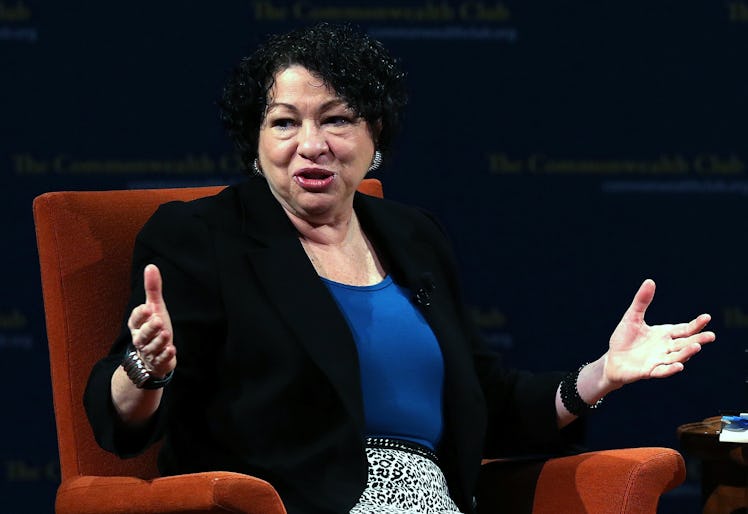
Justice Sonia Sotomayor Slammed Trump's History On The Travel Ban
On Tuesday, June 26, the Supreme Court upheld the legality of President Donald Trump's travel ban by a split decision. Among the judges who voted against upholding the ban was Sonia Sotomayor. Now, Justice Sotomayor's dissent on Trump's travel ban is but another example of an opinion that argues Trump's primary motivation for the ban was to "disfavor Islam."
Sotomayor made that argument by highlighting Trump's comments about Muslims during his presidential campaign and the fact that he has not repudiated those comments since.
"Taking all the relevant evidence together, a reasonable observer would conclude that the Proclamation was driven primarily by anti-Muslim animus, rather than by the government’s asserted national-security justifications," the 64-year-old justice wrote.
The Supreme Court's decision on Tuesday represented a major victory for President Trump, whose first ban was imposed in January 2017, just days after he was inaugurated. Since then, the White House has released different iterations of the ban, partly in response to the challenges the administration faced in federal courts, as the constitutionality of the policy had been consistently questioned over the past year and a half.
The latest ban restricts travel from five majority Muslim countries: Iran, Libya, Somalia, Syria, and Yemen. The ban also places restriction upon two other countries, North Korea and Venezuela. The Supreme Court upheld the ban by a 5-4 vote, with Justice Neil Gorsuch — Trump's lone Supreme Court nominee — voting with the majority.
On Tuesday morning, shortly after the Supreme Court's verdict was reported, President Trump celebrated the decision on Twitter. "Supreme Court upholds Trump travel ban," he wrote in all caps. "Wow!"
In the majority opinion, Chief Justice John Roberts argued against the notion that the travel ban was a "Muslim ban," and asserted that the president is within his authority to impose the ban in the name of national security.
Roberts wrote,
The Proclamation is expressly premised on legitimate purposes: preventing entry of nationals who cannot be adequately vetted and inducing other nations to improve their practices. The text says nothing about religion. Plaintiffs and the dissent nonetheless emphasize that five of the seven nations currently included in the Proclamation have Muslim-majority populations. Yet that fact alone does not support an inference of religious hostility, given that the policy covers just 8 percent of the world’s Muslim population and is limited to countries that were previously designated by Congress or prior administrations as posing national security risks.
The question of whether the Trump's travel ban was more of a Muslim ban or not was indeed central to the public discussion about the ban. Within the Supreme Court, however, the majority ultimately assessed the legality of the ban based strictly on what the policy achieves and how it seeks to achieve it, without much consideration for Trump's rhetoric.
Justice Sotomayor, on the other hand, argued that it was essentially impossible to assess the travel ban while separating the policy from the well publicized thoughts of the policy-maker.
She wrote in her dissenting opinion,
President Trump has never disavowed any of his prior statements about Islam. Instead, he has continued to make remarks that a reasonable observer would view as an unrelenting attack on the Muslim religion and its followers. Given President Trump’s failure to correct the reasonable perception of his apparent hostility toward the Islamic faith, it is unsurprising that the President’s lawyers have, at every step in the lower courts, failed in their attempts to launder the Proclamation of its discriminatory taint.
In addition to arguing that Trump's history of anti-Muslim rhetoric could not be ignored, Sotomayor also argued that the more recent inclusions of Venezuela and North Korea under the ban was an attempt to avoid criticism.
"Consideration of the entire record supports the conclusion that the inclusion of North Korea and Venezuela, and the removal of other countries, simply reflect subtle efforts to start 'talking territory instead of Muslim,'" Sotomayor wrote, "precisely so the Executive Branch could evade criticism or legal consequences for the Proclamation’s otherwise clear targeting of Muslims."
Justice Sotomayor's message is clear. While the majority of the Supreme Court based its decision on the authority of the president, Sotomayor argued that his history of comments about Muslim could not be separated from any judgement on how he uses that authority.